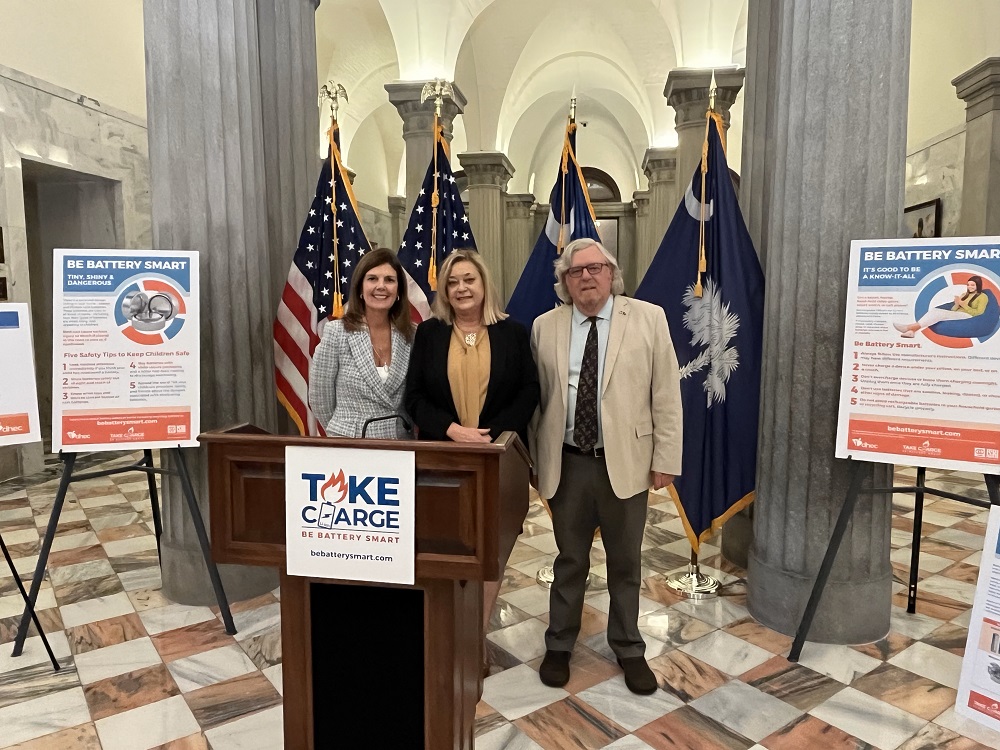To ensure you’re receiving the most up-to-date and accurate information, please choose the correct agency from the homepage. The DHEC website is no longer being updated and will be permanently unavailable Dec. 31, 2024.
Lt. Governor Evette, DHEC, ISRI Launch ‘Be Battery Smart’ Campaign for South Carolina
New public information effort focuses on importance of recycling household batteries and safety hazards posed by certain batteries
FOR IMMEDIATE RELEASE:
Nov. 7, 2023
COLUMBIA, S.C. — A public education campaign designed to increase the public’s understanding of the health and environmental benefits of safely recycling household batteries is launching today in South Carolina, announced the South Carolina Department of Health and Environmental Control (DHEC).
South Carolina Lieutenant Governor Pamela Evette joined Myra Reece, director of DHEC Environmental Affairs, and Cheryl Coleman, Senior Vice President of Sustainability and Advocacy for ISRI, the Voice of the Recycled Materials Industry™, at a news conference today to promote “Take Charge: Be Battery Smart.” This educational campaign focuses on the importance of properly using and recycling household batteries, particularly lithium-ion batteries, which are a type of rechargeable battery. The campaign is created by DHEC’s Office of Solid Waste Reduction & Recycling in conjunction with ISRI, with support from several partner organizations.
Lieutenant Governor Pamela Evette; Myra Reece, Director of DHEC Environmental Affairs; and Barry Wolff, with the Southeast Region of ISRI, the Voice of the Recycled Materials Industry™, announce South Carolina's new "Take Charge: Be Battery Smart" campaign at the South Carolina State House.
"This is an important initiative that affects every South Carolina family," said Lieutenant Governor Pamela S. Evette. "This campaign will help educate families about the hidden dangers of batteries and the economic benefits of recycling. By responsibly managing batteries, we not only protect our loved ones but also contribute to preserving the critical minerals that make up batteries."
Batteries are required for many household essentials, such as remote controls, kids’ toys, clocks and watches, cell phones, laptops and more. Batteries come in various chemistries, types, and sizes to fit different uses. Household batteries are safe to use when properly following the manufacturer’s instructions; however, damaged or improperly stored, used or disposed of batteries – particularly rechargeable lithium-ion batteries – can explode or catch fire.
“The ‘Take Charge: Be Battery Smart’ campaign addresses the lack of consumer awareness about the proper use and management of batteries, which have become such a commonplace item in our day-to-day lives,” said Myra Reece, DHEC’s Director of Environmental Affairs. “We want South Carolinians to understand that household batteries need to be properly recycled in order to limit the potential harm they can cause to people and the environment.”
Lithium-ion batteries, which are a popular type of rechargeable battery, are easy to puncture and can cause fires in garbage trucks and recycling centers and landfills. This can injure those essential workers, including the firefighters who then need to respond. A 2021 study by the U.S. Environmental Protection Agency (EPA) revealed that, between 2013 and 2020, at least 245 fires at 64 solid waste facilities were caused or likely caused by lithium metal or lithium-ion batteries.
“The ‘Take Charge: Be Battery Smart’ campaign is a bold first step toward educating the public on the dangers of improperly storing and disposing of batteries — and raising awareness on this growing problem,” said ISRI President Robin Wiener. "Educating the public on this critical issue is important for the safety of our member companies and employees — and also for first responders and the communities around us. We are proud to partner with the South Carolina DHEC to launch this important campaign that will ultimately keep South Carolinians out of harm’s way.”
Most South Carolina residents have opportunities to recycle batteries at no cost and are encouraged to learn more about battery recycling in their communities.
The Call2Recycle program offers about 16,000 drop-off sites nationwide for household battery recycling, including Best Buy, Lowe’s and The Home Depot. The retailer Batteries Plus also offers recycling options. Additionally, some South Carolina counties have household hazardous material collection programs or collection events that accept certain types of batteries, both single-use and rechargeable.
“Properly recycling batteries keeps millions of pounds of potentially harmful materials in use and out of the landfill and reclaims critical metals such as cobalt and lithium needed for the manufacturing of new products,” said Reece. “Recycling — and recycling batteries in particular — is one of the ways to a sustainable economy and healthy environment.”
Another critical focus of Be Battery Smart is educating the public about the choking hazards posed by small, shiny button batteries. Children are especially at risk for serious injury or even death if they swallow a button battery or put one inside their ear or nose. DHEC and ISRI encourage parents, guardians and caregivers to be informed of how dangerous the small round coin or button batteries can be.
A national study published in 2022 by Safe Kids Worldwide and Nationwide Children’s Hospital showed that a child aged 18 or under visited an emergency room every 75 minutes with a battery-related injury, and button batteries accounted for an estimated 85% of those cases.
Several public information resources, including fact sheets, posters, battery identification charts and more, are all available at BeBatterySmart.com. South Carolinians are encouraged to learn about household batter safety and to share this information with friends, family, coworkers and students.
“Take Charge: Be Battery Smart” is centered on household batteries. It’s important to note that businesses must follow all requirements for both large and small quantity hazardous waste generators.
For more information, visit BeBatterySmart.com. Learn more about ISRI at isri.org.
###
